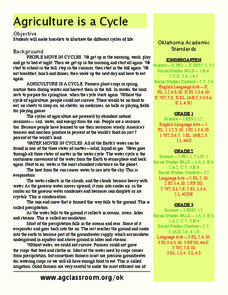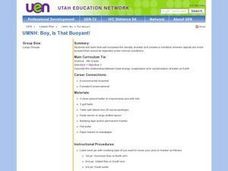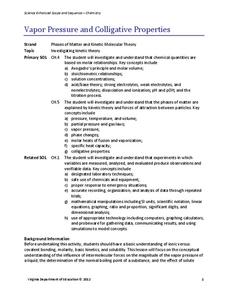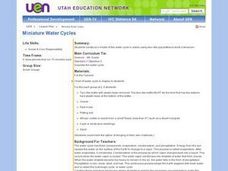Curated OER
The Water Cycle in a Bowl
Students conduct an experiment on the stages of the Water Cycle. In this water cycle lesson, students view the materials needed for the experiment and brainstorm how they relate to the Water Cycle. Students conduct an experiment where...
Curated OER
Agriculture is a Cycle
Students explore cycles in nature. In this cross curriculum agriculture activity, students define "cycle" and research weather and planting folklore. Students make a bracelet in which individual colored beads represent the many "cycles"...
Curated OER
Evaporation Pans & Related Rates
Students calculate evaporation rate using differential equations. In this calculus lesson, students explain how pan evaporation works. They complete a worksheet to sum up the lesson.
Curated OER
Boy, Is That Buoyant!
Fourth graders see that salt increases the density of water and creates a condition wherein objects are more buoyant than would be expected under normal conditions. They describe the relationship between heat energy, evaporation and...
Curated OER
"Tri-County" Project--Water Cycle
Learners analyze the parts of the water cycle through research and experimentation. Particular attention is paid to the processes of evaporation and condensation.
Curated OER
States of Matter
Students categorize items into one of the three states of matter. They participate in a demonstration in which they represent particles of matter. Finally, they complete an experiment in which they "race" top see who can make acetone...
Curated OER
The Water Cycle
Third graders observe that water travels in a cycle. They study the parts of the water cycle: evaporation, condensation, and precipitation. They demonstrate the cyclical movement of water either by drawing the water cycle at the board,...
Curated OER
Where Has All the Water Gone?
Students explore the Earth's water cycle. In this water cycle lesson, students explore evaporation and precipitation, and talk about how engineers create dams based on these concepts. This is a lecture based lesson.
Curated OER
Gases Around Us
Students investigate gases and liquids. In this states of matter online lesson, students examine how evaporation plays a part in the transition of liquids into gases as they watch a kettle of water boil and then work in small groups on...
Curated OER
Molarity
In this molarity instructional activity, students determine the concentration or molarity for each of the solutions. Students manipulate the molarity formula to calculate the moles, mass, or volume of each problem.
Outside Education
Water Cycle Adventure
Evaporation, transpiration, condensation, precipitation, accumulation. Steam, clouds, rain, lakes. Guide your class members on an imaginary journey through the water cycle with a water cycle adventure script.
Virginia Department of Education
Vapor Pressure and Colligative Properties
Hate to vacuum, but enjoy using a vacuum pump? Explore a lesson that starts with a demonstration of boiling water at various temperatures by using a vacuum pump. Then scholars design their own experiments to measure vapor pressure and...
Virginia Department of Education
Heat and Thermal Energy Transfer
How does radiation affect our daily lives? Answer that question and others with a lesson that discusses radiation and its use in thermal energy transfer through electromagnetic waves. Pupils investigate vaporization and evaporation while...
PhET
Concentration
When no more solute can be dissolved into a solvent, the solution has reached saturation. The interactive simulation allows learners to manipulate a solution in order to measure its concentration. The amount of solvent, the amount and...
Concord Consortium
Boiling Point
Is it getting hot in here? Observe boiling from inside a beaker in an engaging interactive. Chemistry scholars heat and cool polar and non-polar solids and observe how molecules react to temperature changes. Your class' misconceptions...
Virginia Department of Education
A Crystal Lab
Young chemists grow ionic crystals, metallic crystals, and supersaturated crystals in three different lab experiments. Observing these under a microscope allows pupils to compare the various structures.
Oceanic Research Group
Heat Transfer and Cooling
Astronauts train underwater to simulate the change in gravity. An out-of-this-world unit includes three hands-on activities, one teacher demonstration, and a discussion related to some of the challenges astronauts face. Scholars apply...
Curated OER
Physical Changes and the Water Cycle - Three
Third graders observe and reproduce the water cycle in their very own classroom. A simple, yet very effective, demonstration on how water evaporates is observed by the young scientists. They make observations and sketches in their...
Curated OER
Rain Forest Terrariums
Fifth graders make rain forest terrariums in order to observe a simulated mini-environment. They place the layers and plants into container and place where it can be observed. They observe the closed water system in the container before...
Curated OER
Miniature Water Cycles
Fourth graders create a biome of their choosing in a terrarium. Terrariums are observed and results recorded daily for 2 weeks. They observe/record changes in the water within their terrarium and use the data to write sentences...
Curated OER
Solids and Water
Students investigate mixtures made of water and familiar solid materials. They observe and discuss the changes that occur immediately and set the mixtures aside for a day. Finally, students observe the mixtures, note changes, and graph...
Curated OER
Dilutions Worksheet
In this dilution worksheet, students determine the final concentrations of solutions after a specific amount of water has been added. This worksheet has 4 problems to solve.
Curated OER
Why is the Ocean Salty?
In this ocean salt worksheet, students read about the processes that have lead to the salt content in the ocean. Then students complete 5 short answer questions.
Curated OER
Recycling Water
In this water worksheet, students review the steps involved in the water cycle. This worksheet has 9 fill in the blank and 3 short answer questions.
Other popular searches
- Water Cycle and Evaporation
- Evaporation Experiment
- Evaporation and Condensation
- Condensation Evaporation
- Evaporation Kindergarten
- Heat and Evaporation
- Water Evaporation
- Melting and Evaporation
- Science Evaporation
- Filtration and Evaporation
- Condensation Evaporation Dew
- Evaporation and Temperature

























